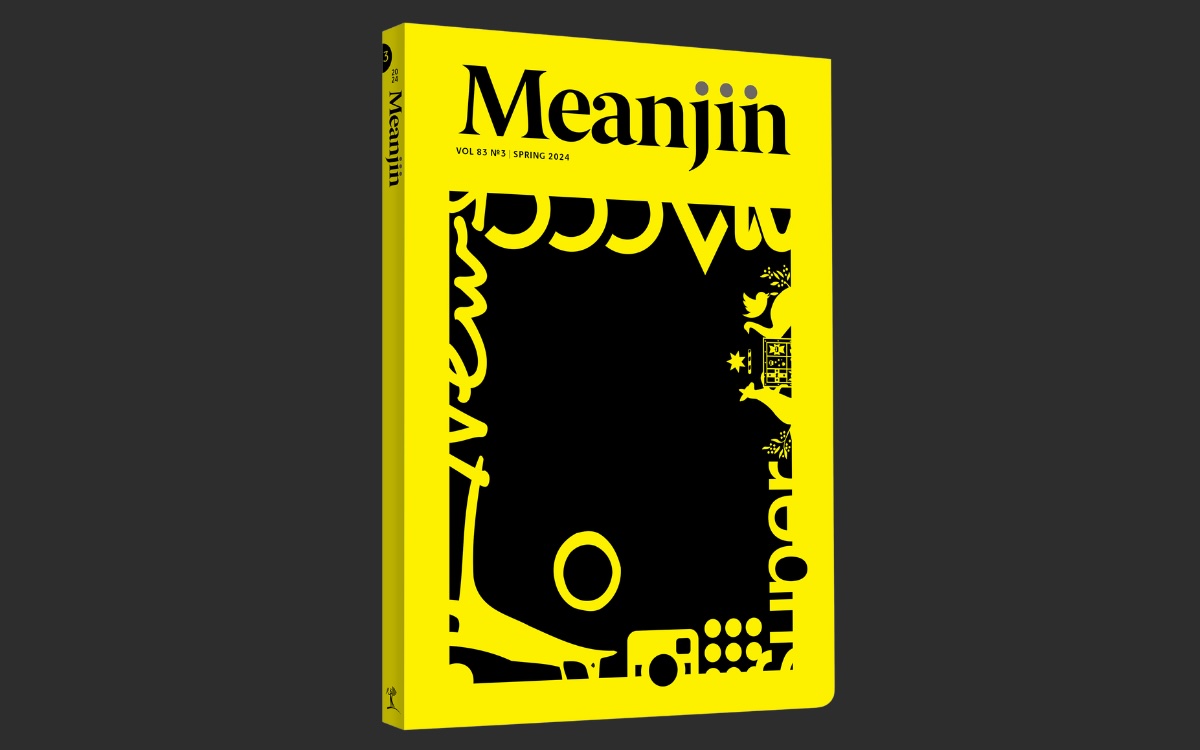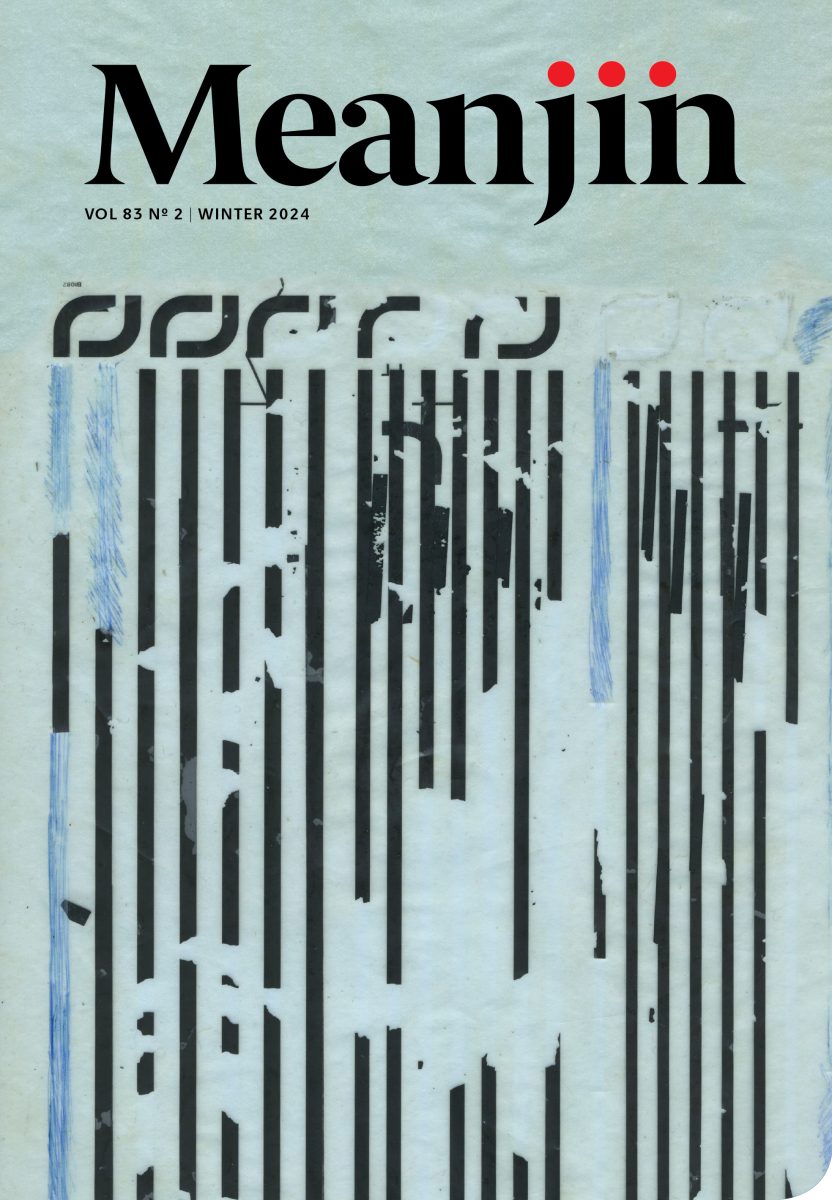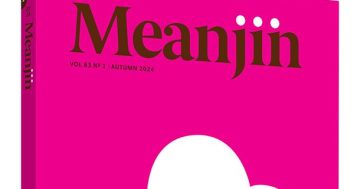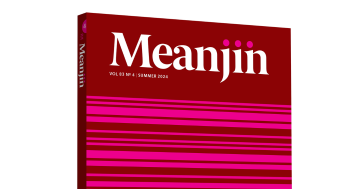
The Spring 2024 edition of the Meanjin Quarterly, edited by Esther Anatolitis, was launched at the National Library of Australia bookshop in Canberra on 5 October. Photos: Supplied.
“Meanjin is where Australia’s literary culture sets out its fiercest ambitions.” Actually, it has a unique role in articulating the Australian cultural moment as it embraces the works of some of our finest writers. A quarterly publication that reflects the breadth of contemporary thinking, be it on literature, other art forms, or the broader issues of the times, Meanjin was founded in Magandjin (Brisbane) in 1940.
The Spring 2024 edition of the Meanjin Quarterly, edited by Esther Anatolitis, was unveiled in Canberra at the National Library of Australia on 5 October. Volume 83 No 3 was launched manifesto-style, out on the front steps where Owen Bullock read his poem The sunflower of loss. Once inside, professor of history at the Australian National University Frank Bongiorno joined editor Esther Anatolitis in conversation on Bongiorno’s essay Lucky for some: Donald Horne’s The Lucky Country at 60.
It was then time to enjoy readings and conversation with contributors from Australia’s leading journal of writing and ideas. Always looking for new ways to learn. Let’s rethink constitutional monarchy. The Australian Constitution.
Anatolitis, who is one of Australia’s most influential advocates for arts and culture, elaborates on what’s in the Spring edition: “Turns out Australia has a king and he’s planning a visit: to greet him, Jenny Hocking reflects on racism, power and royal privilege, while Frank Bongiorno marks 60 years since The Lucky Country taunted its way into our vernacular. As ever, Lee Lai’s framing illustration is compelling: the Colonial Frontier Massacre Map 1788-1930 is a project we should all get to know well.”
Some useful tools are also included, with Claire G Coleman’s annotated Constitution, which is “about to become our democracy bible”.
Enriching this edition’s analyses and polemics are spirited and individual pieces. Andrew Millar on where love will not go. Adrian Mouhajer on love as worship. Taribelang writer Ella Ferris on the loneliness, hyper-diligence and endless love of deep familial care.
For more than eight decades, the publication has fostered a rich and rigorous national conversation by remaining true to its founding principles: ‘‘to talk poetry’’, ‘’to work for a healthy climate of opinion and literary activity’’, and ‘’to make clear the connection between art and politics”.
Critical discussion is important, which the quarterly continues to highlight, in line with the words of its founding editor Clem Christesen: “to reveal and clarify our life by showing it to us through a vision different from ours and deeper”.
Meanjin Quarterly, Spring 2024 edition, edited by Esther Anatolitis, Melbourne University Publishing, $24.99

Meanjin Quarterly, Winter 2024 edition, edited by Esther Anatolitis, challenges us to activate as critical thinkers.
Recovering language. Diagnosing democracy. Repairing with great care. Writers in Meanjin Quarterly, Winter Edition, diagnose an Australian democracy in trouble.
They challenge us to activate — as readers and critical thinkers, as tourists and explorers, as vigilantes and citizens – and play with our expectations of what comes next.
However, Volume 83.2 begins by listening, as it does in each edition. The Meanjin Paper is Djandak Dja Kunditja: Country healing its home, by Dja Dja Wurrung elder Rodney Carter.
In the wake of the Voice outcome, it’s vital “we foster ever-more-sophisticated understandings of First Nations and First Peoples”. The suppression of Indigenous language rights is addressed by Gerald Roche. Aidan Hookey takes us to Uluru and wonders why the local signage treats even First Peoples as tourists.
Following the National Anti-Corruption Commission’s decision not to pursue the architects of Robodebt, there’s a deeply moving memoir from Kaitlyn Blythe titled Data-matching. She explains, in detail, about debts, being tired and worried, and feeling isolated. Being pushed even further under the poverty line, panic attacks are prevalent.
Kaitlyn’s depths of despair are evident. “… Constant housing insecurity, food insecurity and bodily illness is horrible, horrible, horrible. I see no hope. No future. And I want to die …”
In particular, this one sentence speaks volumes: “If I don’t make it, and somebody finds this and reads it, here’s some stuff for the record.”
Constitutional and international law experts Emily Crawford and Elisa Arcion deliver an incisive essay titled Not one constitution but three constitutions in a trenchcoat.
Patrick Marlborough exposes the precarious role of freelance journalism in holding power to account, while Michelle Sowey looks at developing children’s critical thinking.
Writers reframe our perceptions of the built environment and what makes public space. This season’s interview is with feminist architecture critic Naomi Stead. Australia in Three Books is by renowned architecture advocate Stuart Harrison. The Year In … looks at the repair of our built and cultural environment, by architecture and philosophy theorist Helene Frichot.
Meanjin Quarterly, Winter 2024 edition, edited by Esther Anatolitis, Melbourne University Publishing, $24.99




